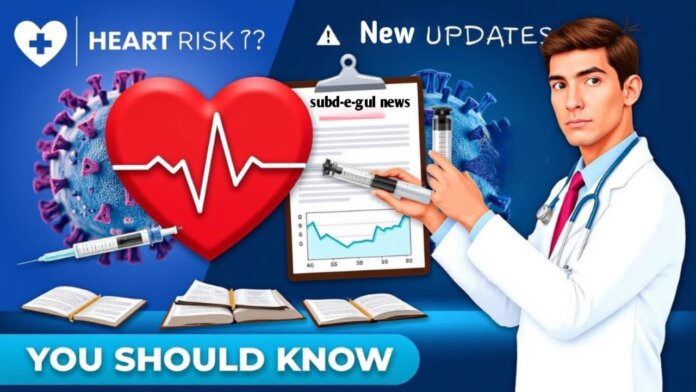The Latest on COVID Vaccines and Heart Safety
So, you might have heard some talk about COVID vaccines and heart risks. Let’s break down what’s really going on, using simple words and the newest info. Recently, health groups like the FDA and CDC shared updates about very rare heart issues linked to vaccines. But don’t panic! These problems are extremely uncommon, and experts still say vaccines are lifesavers.
Think of it like seatbelts. Sometimes, seatbelts might cause a bruise in a crash (rare!), but they stop you from flying through the windshield. Vaccines work the same way—they protect you from severe COVID, which is MUCH riskier for your heart.
What Are These Heart Risks?
Myocarditis and Pericarditis Explained
Myocarditis (my-oh-car-dye-tis) means swelling of the heart muscle. Pericarditis (pair-ih-car-dye-tis) is swelling around the heart. Both can cause chest pain or shortness of breath.
Who’s Most Affected?
These cases are mostly seen in:
- Teen boys and young men (under 30)
- People who got mRNA vaccines (like Pfizer COVID vaccine or Moderna)
- Usually after the second dose
But here’s the key: Out of millions of shots given, only a tiny group had issues. For example, in teens aged 12–17, the CDC reports about 70 cases per million doses. Most recovered quickly with rest and medicine.
Why Did the FDA Update Warnings?
Keeping You Informed
In 2023, the FDA COVID vaccines team added clearer labels about heart inflammation risks. Why? Not because the risk increased, but because they want you to:
- Know the signs (chest pain, trouble breathing).
- Get help fast if you feel them.
- Understand that benefits still beat risks by a HUGE margin.
Dr. Sarah Long, a heart specialist at Johns Hopkins, puts it simply:
“COVID itself causes myocarditis 100 times more often than vaccines. Getting vaccinated is still the safest choice.”
Real Stories: People Who Faced Vaccine Heart Risks
Alex’s Story (Age 16)
Alex felt chest pain 3 days after his second Pfizer shot. His mom took him to the ER. Doctors found mild myocarditis. He stayed in the hospital for 4 days, took ibuprofen, and was back playing soccer in 3 weeks. Alex says:
“It was scary, but COVID put my grandpa in the ICU. I’d still get vaccinated to protect my family.”
Why Stories Like Alex’s Are Rare
Less than 0.001% of vaccinated people under 30 had heart issues. Meanwhile, COVID infections cause heart damage in 1 out of 100 people even young, healthy ones!
Should You Still Get Vaccinated? YES. Here’s Why.
COVID Is Harder on Hearts Than Vaccines
Data shows unvaccinated people are:
- 7x more likely to get myocarditis from COVID
- 10x more likely to end up in the hospital
- At higher risk of long-term heart problems
How Experts Weigh the Risks
The American Heart Association confirms:
✅ For most people, vaccine heart risks are VERY low.
✅ Vaccines prevent deadly COVID complications.
✅ If you’re under 30, discuss timing with your doctor (e.g., waiting 8 weeks between doses).
Keep Your Heart Healthy: Simple Tips!
Whether you’re vaccinated or not, protect your heart with these steps:
- Move daily: Walk, dance, play sports! (30 mins/day)
- Eat colorful foods: Berries, veggies, nuts.
- Sleep 8+ hours: Helps your heart recharge.
- Don’t ignore symptoms: Chest pain? Trouble breathing? Tell an adult ASAP!
FAQs:
Is the COVID vaccine linked to cardiac events?
In rare cases, yes mostly mild myocarditis/pericarditis in young males. But COVID infection poses a bigger heart threat.
Are there long-term side effects of the COVID vaccine?
Scientists have tracked vaccine side effects for 3+ years. No evidence shows long-term heart problems from vaccines.
Can COVID vaccine cause an irregular heart beat?
Temporarily, maybe. Serious rhythm issues are extremely rare. COVID is more likely to cause this.
What are the problems with Pfizer COVID vaccine?
Pfizer (and Moderna) are linked to rare myocarditis in young people. Most cases are mild and resolve fast.
Have heart attacks increased since COVID?
Yes, but due to COVID infections not vaccines. The virus causes blood clots and artery damage.
How long does a vaccine stay in your body?
Vaccines teach your immune system in days, then break down. They don’t “stay” in you long-term.
Can COVID affect your heart rate?
Yes! Many people get fast or irregular heartbeats during or after COVID.
How to keep your heart healthy?
Exercise, eat veggies, avoid smoking, and manage stress.
Is myocarditis permanent?
Most vaccine-related cases heal completely. Severe myocarditis (usually from viruses) can cause lasting damage.
What are the long-term effects of COVID?
“Long COVID” can include heart palpitations, fatigue, and brain fog for months/years.
What causes heart failure?
High blood pressure, blocked arteries, diabetes, or viruses (like COVID).
Can the COVID vaccine raise blood pressure?
Temporarily, due to anxiety or soreness? Yes. Long-term spikes? No evidence.
The Bottom Line
COVID vaccines heart risk warning updates remind us to pay attention to rare side effects—but don’t change this fact: Vaccines save lives. Heart problems from COVID are far more common and dangerous. Talk to your doctor if worried, but stay protected!
ℹ️ Sources: CDC, FDA, American Heart Association, Johns Hopkins Medicine.
📢 Remember: This info is current as of June 2025. Always check trusted sites like CDC.gov for updates.



